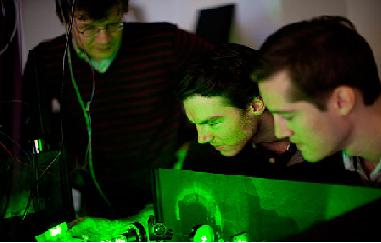Harvard researchers have achieved a significant breakthrough in quantum computing that provides impetus to ongoing work in the development of a functional quantum computer.
 Mikhail Lukin and Team
Mikhail Lukin and Team
The quantum equivalent of bits, known as qubits, are the key constituents of quantum computing. The primary challenge in applying quantum computing to real world applications is the development of qubits to exist at room temperature in a solid state system. Current systems employ expensive and specialized equipment to confine single electrons or atoms in vacuum and bring down the temperature of the entire system to near-absolute zero. A team of researchers at Harvard led by Physics Professor Mikhail Lukin have succeeded in addressing this challenge by employing diamonds, the purest element on earth.
The team developed qubits by introducing a pair of impurities in laboratory synthesized, ultra-pure diamonds. The team discovered that they were able to store information in the bit for close to two seconds which translates as an increase in the lifespan of stored information by almost six orders of magnitude. The work could serve as precedent to a range of other applications apart from quantum computing.
Lukin believes that only technical issues serve as impediment and it is still possible to identify techniques to extend the information storage lifespan from seconds to hours. Such an achievement could pave the way for a number of real world applications. Lukin envisages novel applications such as “quantum cash”, a payment system for financial transactions that employs coded quantum bits and “quantum networks”, a highly secure data transmission system using quantum bits.